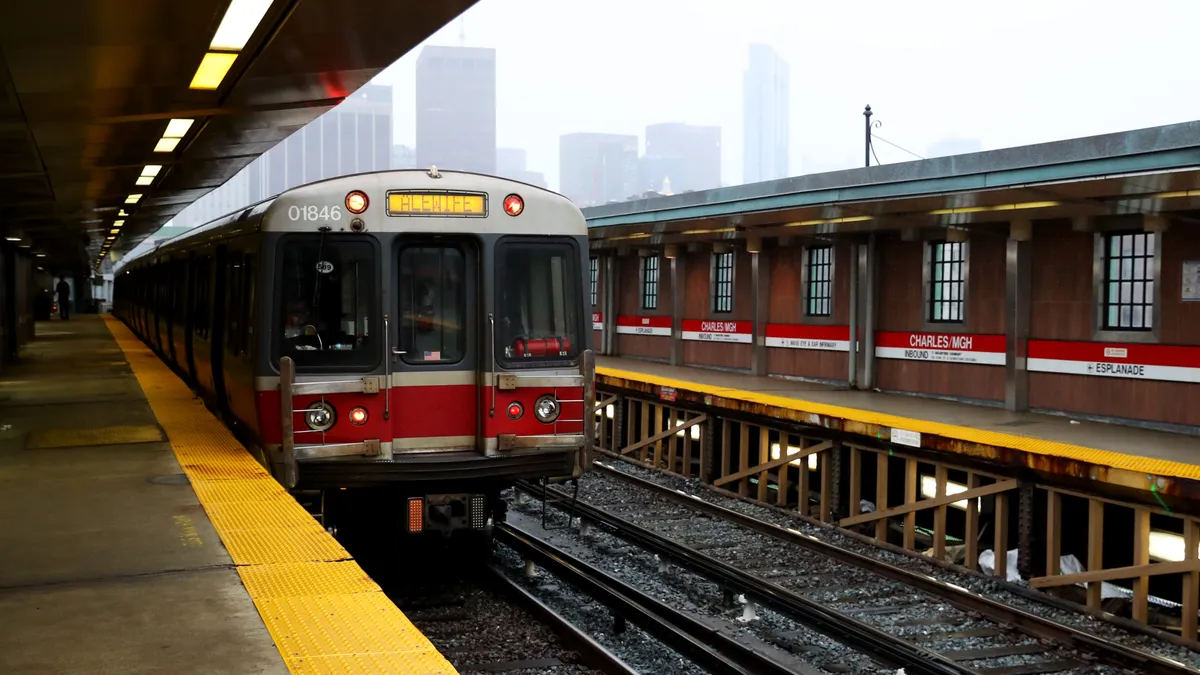U.S. Senators Elizabeth Warren and Ed Markey blasted state transit officials during a rare congressional subcommittee hearing Friday in Boston, looking into safety failures at the Massachusetts Bay Transportation Authority that resulted in a safety management inspection by the Federal Transit Administration this summer.
Warren and Markey were joined by Boston Mayor Michelle Wu, MBTA General Manager Steve Poftak, Massachusetts Department of Public Utilities Chair Matthew Nelson and Jarred Johnson, executive director at TransitMatters, a local transit advocacy group.
“It is shameful that the first public transportation system in our country has been put last, and has lost the faith of the people of Massachusetts,” said Markey during the hearing.
In a report issued on Aug. 31, the FTA faulted MBTA leadership and the Massachusetts Department of Public Utilities, which is responsible for oversight of the transit agency, for these safety failures.
“As riders continue to return to the system now, I understand the frustration many of them feel,” said Poftak in his prepared remarks. “I want to state unequivocally today to the committee and to our customers that the system is safe, but we can and will do better.”
The FTA went into action earlier this year, following a spate of dangerous incidents on the MBTA’s rail transit lines including runaway trains, collisions and derailments. One passenger was dragged to his death when a train departed with his arm trapped in a closing door. “The pattern and number of serious incidents indicated that safety risk was headed in an unacceptable direction,” said FTA Administrator Nuria Fernandez at Friday’s hearing.
Federal inspectors issued a series of special directives to the MBTA and the DPU. In response, the transit agency shut down one major heavy rail line, the Orange Line, for a 30-day repair blitz. Service resumed Sept. 19.
But Wu said in her prepared remarks, “After an unprecedented 30-day shutdown of our busiest subway line, we all still hold our breath and cross our fingers when we step into stations and look up to see when the next train will arrive.”
Johnson added that “Residents along the Orange Line are dealing with increased headways as well as slow zones nearly a month after the [MBTA] promised their service would improve.”
Warren pressed Poftak and Nelson on their stewardship of the transit system during their leadership, which goes back to 2019. Addressing Nelson, she said, “Obviously you have not taken enough action.”
In his prepared remarks, Nelson said, “The DPU takes its responsibility to ensure the safety of riders of the MBTA’s transit system very seriously, and we have been working closely with the FTA and the MBTA to implement the FTA’s recommendations.”
Markey criticized the agency’s work. “The DPU has not been a watchdog. The DPU has become a regulatory black hole into which all of the safety issues fall,” Markey said to Nelson.
Wu was asked by Warren about the consequences of riders’ lack of confidence in the MBTA system. “When ridership goes down, that means more traffic for everyone. That means the entire region is paralyzed and so any question of safety hurts our residents and it hurts our economy,” Wu said.
In his prepared remarks, Poftak estimated the cost of repairs for the first group of items required by the FTA at $300 million, and between $225 million and $300 million over six years for the second set of items outlined in the August report. Massachusetts Gov. Charlie Baker has requested a $200 million supplemental budget to cover the unfunded costs of the first set of items.
“I just want to make clear: making these safety changes is not optional,” Warren said.












